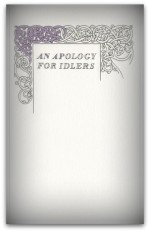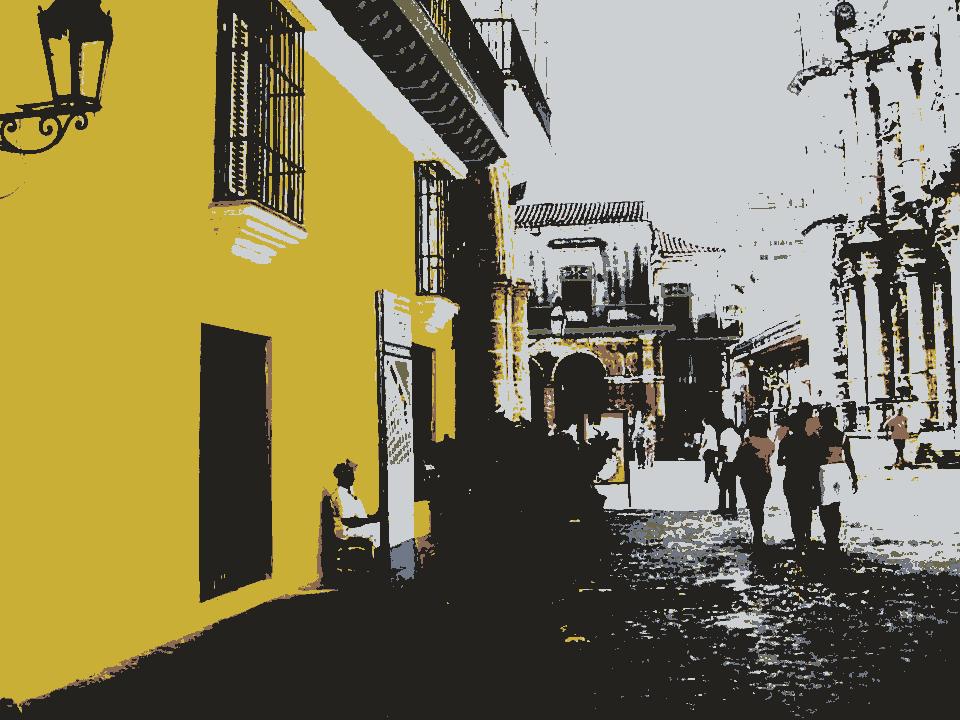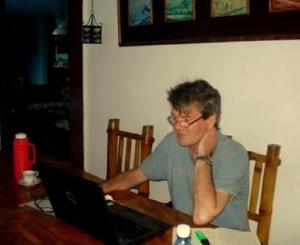Idleness is a word that encompasses a great deal of human activity. I suppose in today’s society it is a dirty word. We’re all supposed to be rushing around being proactive, inspiring change, making things happen – why we should do that is rarely questioned. Idleness is associated with those on benefits, people who don’t want to work, loafers, scroungers, drains on society.
But I don’t think of idleness as meaning that. Idleness can merely mean stopping to think. How many people actually stop to think about anything, free from the distractions of TV, the Internet, their phones, games – the constant babble of civilisation?
Robert Louis Stevenson wrote the essay An Apology For Idlers in 1876. He could not imagine the ways one can be idle today; just the welfare state and technology would have been unimaginable to him. But his points remain as true today as they were then; many, many things have changed, some things remain the same.
.
Idleness so called, which does not consist in doing nothing, but in doing a great deal not recognised in the dogmatic formalities of the ruling class, has as good a right to state its position as industry itself. It is admitted that the presence of people who refuse to enter in the great handicap race for sixpenny pieces, is at once an insult and a disenchantment for those who do.
.
Ah, the mad pursuit of money for its own sake. I read today that Tony Blair insists that he is ONLY worth twenty million, not the one hundred million that some claim. Why does he want that much? What will he do with it? Apart from other obvious acts of his, isn’t it a little disturbing that a man who chases after money with such enthusiasm ran the country for ten years? Do the people who run after more and more money all their lives ever stop to think: What did I do with my life? Well, Tony Blair is a ‘Middle East peace envoy’. But that’s a joke, isn’t it?
Stevenson again:
Many make a large fortune, who remain underbred and pathetically stupid to the last.
He continues:
While others (at school) are filling their memory with a lumber of words, one-half of which they will forget before the week is out, your truant may learn some really useful art: to play the fiddle, to know a good cigar, or so to speak with ease and opportunity to all varieties of men.
I learnt very little at school. My education began while I was playing truant, but mostly after I left. I chose what I needed to learn. I don’t think anybody does learn much at school, apart from perhaps how to read and write, if they didn’t know how already. Most real learning comes from life. An uneducated person can be very wise, an educated person very stupid. But there is no place for the wise today.
.
I suppose the best universities and some private schools provide something better for people. But our government was, and is, full of these people: Tony Blair, David Cameron, Nick Clegg et al – born privileged, they seem to be magnificently ignorant, have worked nowhere, apart from perhaps PR or the Law, have never fought, have never had to worry about paying a bill. No knowledge of history (unimportant), can’t do simple multiplication, completely out-of-touch with ordinary people – hardly a good advertisement for the education which produced them.
Stevenson continues:
Might not the student afford some Hebrew roots, and the businessman some of his half-crowns, for a share of the idler’s knowledge of life at large, and Art of Living? Nay, and the idler has another and more important quality than these. I mean wisdom. He will have a great and cool allowance for all sorts of people and opinions. If he finds no out-of-the-way truths, he identifies himself with no very burning falsehood.
.
Politicians, leaders generally (not all), never stop to think; they are too busy. As are many in the mad rush for money, the only true gauge of worth today:
.
Extreme busyness, whether at school or college, kirk or market, is a symptom of deficient vitality; and a faculty for idleness implies a catholic appetite and a strong sense of personal identity. There is a sort of dead-alive, hackneyed people about, who are scarcely conscious of living except in the exercise of some conventional occupation.
.
They have no curiosity; they cannot give themselves over to random provocations; they do not take pleasure in the exercise of their faculties for its own sake; and unless Necessity lays about them with a stick, they will even stand still. It is no good speaking to such folk: they cannot be idle, their nature is not generous enough; and they pass those hours in a sort of coma, which are not dedicated to furious moiling in the gold-mill.
.
Stevenson’s essay reminds me of my travels. The sheer happiness and joy of living one often witnesses in poor countries. I can vouch for the happiness of children in Cuba, India, Indonesia and parts of Africa. I have read about the amazing resilience of the untouchables in Bangladesh and Bhopal. I am not suggesting that we should copy their economies and become poor, but we have lost something here. Something is very wrong with our lives.
.
There is no duty we so much underrate as the duty of being happy. The other day, a ragged, barefoot boy ran down the street after a marble, with so jolly an air that he set everyone he passed into a good humour. A happy man or woman is a better thing to find than five-pound note. He or she is a radiating focus of goodwill; and their entrance into a room is as though another candle had been lighted. We need not care whether they could prove the forty-seventh proposition; they do a better thing than that, they practically demonstrate the great Theorem of the Liveableness of Life.
.
I’ll remember this on my next trip to Cuba, a poor country that has much wrong with it. But one of those wrongs is not the happiness of the children (or most of the adults, come to that). I have heard young Cubans crying very few times in years of visiting and staying (they laugh all the time). It is impossible in England to visit a supermarket or a cafe without hearing some spoilt child screaming its head off, its parents having no idea what to do with it, apart from perhaps buy it something else. The children have no shame; they don’t care who they disturb or who sees them. I would never have cried in front of other people when I was a child. I rarely cried at all. Today there are dozens of them, every day, everywhere.
.
But back to idling and a last warning from Stevenson:
.
They have dwarfed and narrowed their souls by a life of all work and no play; until here they are at forty, with a listless attention, a mind vacant of all material amusement, and not one thought to rub together with another, while they wait for the train. This does not appeal to me as being Success in Life.
.
A marvellous essay, as true now as when it was written, 138 years ago.


